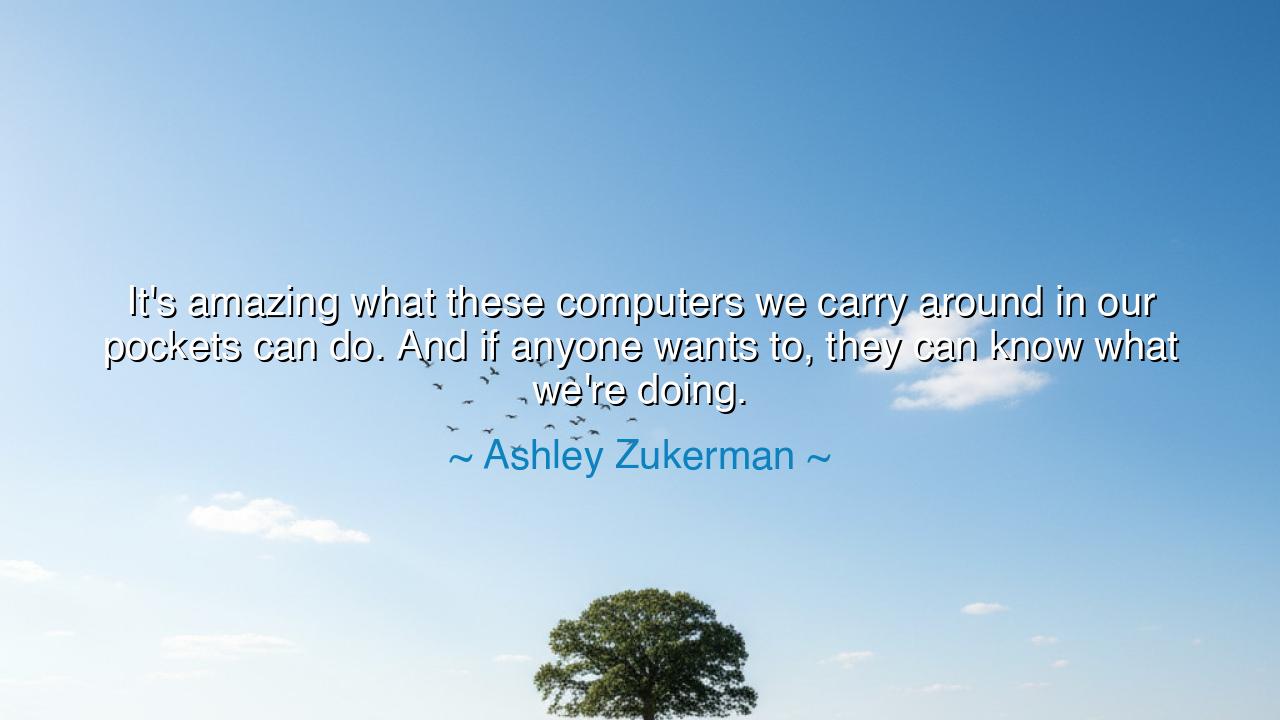
It's amazing what these computers we carry around in our pockets
It's amazing what these computers we carry around in our pockets can do. And if anyone wants to, they can know what we're doing.






In the ever-changing world of technology, where the ancient art of communication has evolved into the age of digital dominance, there is a truth that reverberates through the words of Ashley Zukerman: “It’s amazing what these computers we carry around in our pockets can do. And if anyone wants to, they can know what we’re doing.” At first glance, this might seem like a commentary on the incredible power of modern technology, but beneath the surface lies a warning—that our growing reliance on these devices has brought with it profound questions about privacy, freedom, and the nature of human connection.
In the ancient world, communication was an art deeply rooted in face-to-face exchange. Socrates, for example, engaged in the most intimate of dialogues in the Agora, the open marketplace of Athens. There, conversations were public, raw, and direct, conducted with no intermediary but the mind and voice of the speaker. However, there were also risks—what one said in the Agora could spread like wildfire, for all to hear and judge. Yet, despite this exposure, there was still a certain control over how and when one’s actions were scrutinized. The only way one could truly be known by others was through their physical presence, and even then, their words and deeds were subject to the natural rhythms of time.
Today, as Zukerman rightly points out, we live in a world where privacy is no longer a matter of physical presence but one of digital accessibility. With the simple glow of a screen, the world can peer into the details of our lives—our habits, preferences, and even our thoughts. The small, pocket-sized computers we carry are no longer just tools for communication, but windows into our personal worlds, accessible to anyone with the right digital keys. Plato once warned of the dangers of public life, urging that true wisdom and self-reflection often came from retreat and solitude. Yet in today’s world, solitude is no longer a sanctuary from judgment—for even in our moments of solitude, we are never truly alone.
Consider the example of Julius Caesar, the mighty leader of Rome, whose every move was documented and scrutinized in the public eye. Caesar understood the immense power of visibility, shaping his image carefully to create the persona of the unassailable leader. Yet, even Caesar, despite his ability to control information, was vulnerable to the tides of public perception. Today, unlike Caesar, we are all exposed, whether we wish it or not, to the eyes of the digital world. Every message, every post, every action is traceable, and while we may try to control our online presence, we are always at risk of being watched, analyzed, or interpreted in ways that we can neither control nor predict.
The lesson in Zukerman’s words speaks to the balance between freedom and privacy. In the past, kings and philosophers ruled over empires or ideas with the knowledge that their actions were limited by the reach of physical boundaries. Today, that very same reach extends into the digital ether, where the consequences of our actions are no longer bounded by physical space. Surveillance, whether overt or covert, has become a constant companion in the digital age, and the question Zukerman poses is not only about the power we hold in our hands, but the power that others now hold over us.
This is where the ancient teachings of wisdom come into play. The great philosopher Confucius taught that self-discipline and awareness of one’s actions were central to leading a virtuous life. Just as the ancient emperors controlled the flow of information to maintain their power, so too must we navigate the digital age with wisdom, understanding that the very devices we use to connect with the world also connect the world to us in ways we cannot always see. Privacy—once a sacred element of human life—is now a currency we must guard. To live in today’s world is to be aware of the consequences of every action, every word, every click, and to act with the knowledge that our lives are now etched into the vast network of digital consciousness.
Thus, the practical action we must take is clear: to embrace technology, but with an understanding that it must never replace the wisdom of mindful living. Privacy is a precious commodity, one that we must not trade away lightly. While the world is increasingly connected, we must learn to navigate this new landscape with a sense of purpose, intentionality, and awareness. Like the ancients, we must remain vigilant in our understanding that not all knowledge is beneficial, and that sometimes, the greatest freedom lies not in what we can access, but in what we choose to guard from the eyes of others.
Let us live in the modern world with the ancient wisdom that while we may hold the power of the world in our hands, the true mastery lies in how we choose to use it. Technology should serve us, not control us. In every moment of connection, let us ask ourselves: What is truly important for the world to know? What power do we give away when we allow our lives to be laid bare? The future is ours to shape, but it begins with wisdom, awareness, and the courage to guard the most precious parts of ourselves.






AAdministratorAdministrator
Welcome, honored guests. Please leave a comment, we will respond soon